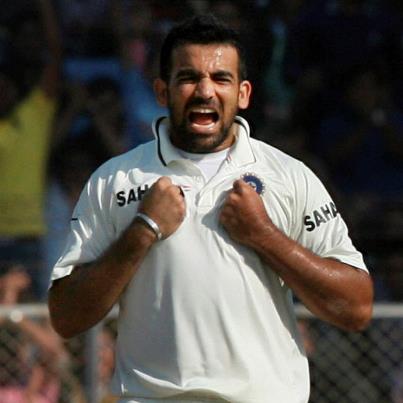
Mumbai, November 21: Pace bowlers were meant to be mere side casts to offer relief to the aching fingers of R Ashwin and Pragyan Ojha. But after the first Test, Zaheer Khan and Umesh Yadav have proved unequivocally that they are here not to fill the numbers.
Yes, the spinners have bowled more overs – 137.2 to pace bowlers’ 72.3 – at Ahmedabad and the tweakers have taken 13 wickets whereas Zaheer and Umesh have accounted for seven English batsmen. So, the numbers suggest an overwhelming superiority of spinners at Motera, but the truth couldn’t be farther.
The slow nature of the pitch at the Sardar Patel Gujarat Stadium ensured that spinners wouldn’t be as strong a force as they were reckoned to be, something that irked Indian skipper Mahendra Singh Dhoni, a strong advocate of turners at home.
There were periods, especially in the second innings, when Ojha and Ashwin struggled to maintain their stranglehold over English batsmen, forcing Dhoni to turn to his quicker options. And how splendidly Zaheer and Umesh responded to a difficult task!
The lack of bounce and movement at Motera would have disheartened any other pace bowler. The English pace troika of James Anderson, Stuart Broad and Tim Bresnan often appeared clueless on how to trouble the Indian batsmen on a benign pitch; frustration creeping in steadily into them.
But on day four of the first Test, Zaheer and Umesh showed a way to make an impact on such tracks – in contrasting fashions. England openers Alastair Cook and Nick Comption had added 111 at stumps on day three, and India needed a quick breakthrough to prevent the alliance into becoming something more damaging, and there hardly were any signs of spinners doing the job.
Here, Zaheer showed his mastery over the conditions. The veteran left-arm seamer troubled Compton bowling from around the wicket, and then switched to over the wicket and the change of angle did Compton in. It was pure craftsmanship, purchasing a wicket with sheer skill than waiting for pitch or conditions to do any favour.
Even after Ojha’s double strike to jettison Kevin Pietersen and Jonathan Trott, India needed couple more strikes to give more wind to their onward journey, and this time Umesh put his hand up. The Vidarbha fast bowler is entirely different from his senior partner, relying on outright pace to fill the wicket column. On the face of it, the strategy might not appear a proper one, particularly on a slow pitch like the one at the Motera.
But Umesh showed cour¬age to back his strength and even on a flat surface his line was enough for him to dismiss Ian Bell and Samit Patel, though fortune’s hand was prominent in getting the wicket of Patel.
It didn’t matter even one bit as the wickets – coming off successive deliveries -- were a reward for sticking to his philosophy even in trying conditions – bowling fast and aiming either at the stumps or the pads.
Skipper Dhoni sounded quite happy about his pacers’ performance. “Our fast bowlers bowled really well. Zaheer put in a lot of effort, and we’ve seen Umesh improving. He’s bowling quick. The contribution of the fast bowlers was really important. They gave us the breakthrough when it was really needed,” Dhoni said.
Their performance is also a sharp reminder to us that pacers can succeed here. There have been many fast bowlers, who conquered the barren surfaces here. The list features such names as Kapil Dev, Richard Hadlee, Malcolm Marshall, Dale Steyn, Shoaib Akhtar, Neil Foster and Makhaya Ntini. Now, Zaheer and Umesh have underlined the fact that following correct strategy could fetch rewards in any kind of pitch.
Umesh agreed. “The pitch has been very slow, and you need a lot of patience here to get the wickets. I followed my plan, and it was to bowl quick and as straight as possible, so that batsmen can’t relax against me,” Umesh said.
The conditions in the upcoming Tests in Mumbai, Kolkata and Nagpur couldn’t be entirely dissimilar, and India will require Zaheer and Umesh to carry on their brilliant job there as well, which will be significant to India’s effort to win the series. They have taken the first step in the right direction.





Comments
Add new comment